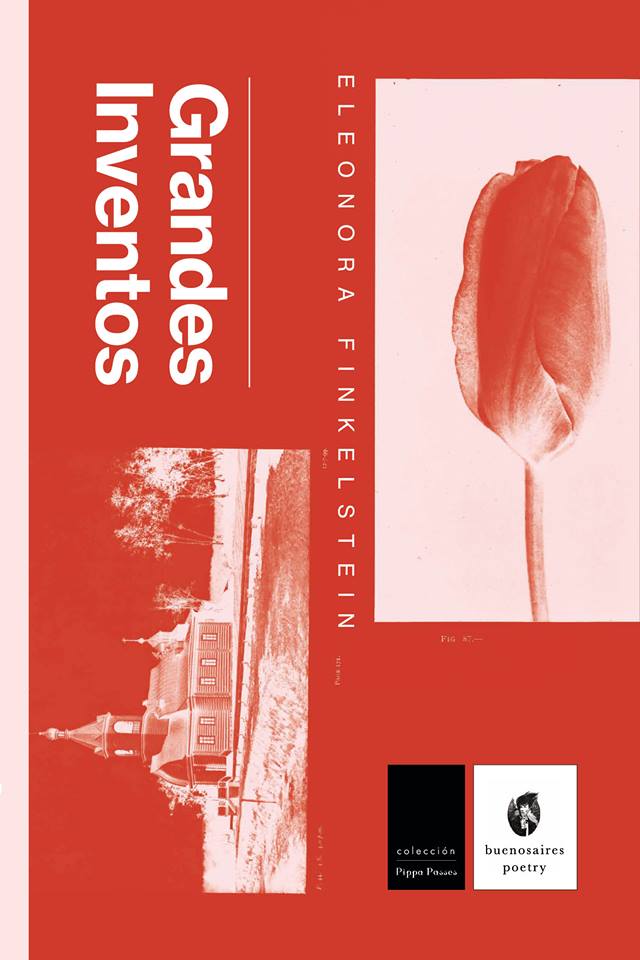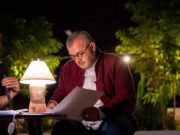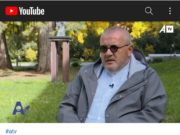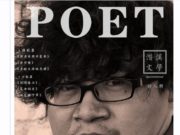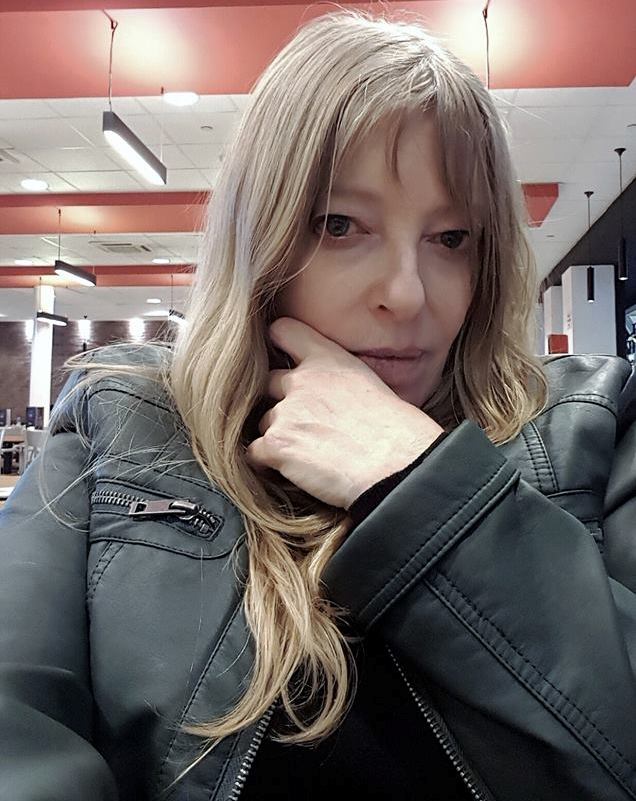Doce poemas / Twelve poems
Translated from Spanish into English by Rachel Cohn
Eleonora Finkelstein (Mar del Plata, Argentina, 1960) es poeta, editora y crítica. Ha publicado los libros de poesía Hamlet y otros poemas (1997), parcialmente traducido al inglés (Hamlet and other poems, Fairfield University, Estados Unidos, 1999), Las naves (2000), Delitos menores (2004 y 2016), Grandes inventos (Buenos Aires Poetry, 2017) y Todo se transforma (Valparaíso México, 2017). Además, es autora de artículos, prólogos y traducciones. Desde 1991 reside en Santiago de Chile, donde se desempeña como directora de RIL editores. Es co-fundadora y directora de Ærea. Revista Hispanoamericana de Poesía, y de sus colecciones de poesía y traducción.
Los poemas de esta muestra pertenecen al libro Delitos menores (Minor Crimes) que está siendo traducido al inglés por Rachel Cohn, dentro del programa de Literatura en Español de Kenyon College, donde se especializa en traducción literaria, cine y antropología.
Eleonora Finkelstein (Mar del Plata, Argentina, 1960) is a poet, editor, and critic. She has published the following books of poetry: Hamlet y otros poemas (1997), partly translated into English (Hamlet and other poems, Fairfield University, United States, 1999), Las naves (2000), Delitos menores (2004 and 2016) Grandes inventos (Buenos Aires Poetry, 2017) and Todo se transforma (Valparaíso México, 2017). She is also the author of articles, prologues, and translations. Since 1991 she has lived in Santiago de Chile, where she is the director of RIL editores. She is the co-founder and director of Ærea. Revista Hispanoamericana de Poesía, and its collections of poetry and translation.
The poems in this sample belong to the book Delitos menores (Minor Crimes) that is being translated into English by Rachel Cohn, within the Translation Program of Spanish Literature at Kenyon College where she specializes in literary translation as well as film studies and anthropology.
Todo el resto
I
Lejos de mí, de Alejandría.
Morirse balbuceando
algo de Justine.
Algo, acerca del amor y cosas
peores todavía.
Ay, aquellos tiempos
cuando trabajábamos
y trabajábamos como hormigas
desvelados en puras inutilidades.
Un poco más flaco y ya estás muerto,
le decía y enterraba
mi dedo en sus costillas.
Gramo más, gramo menos,
ahora ya estás muerto.
II
No sé. No estoy segura.
Podría saludar esos huesos felices
si pasaran volando
como pájaros prehistóricos
con ruido de articulaciones.
Podría incluso saludar a la bandera.
A cualquier bandera
mientras las cosas fueran lo que son.
Pero tampoco estoy segura.
Y ahora no sé dónde encontrarte
manchado de tierra persistente o rojo vivo.
Colgado de vos mismo en el esqueleto
de siempre y sin embargo nuevo
cada tanto, cada poco. Creo.
Pero no sé y me horroriza, me horroriza
como si hubiera muerto un niño.
Solo la ciudad es real.
Solo la literatura
y este ardor en la garganta
y mi manera de adorar el suelo
como si a esa altura existiera el paraíso.
Pero solo la ciudad es real.
A veces, la literatura.
III
Quizá recién ahora se trata
del último aliento,
del asma o de la marihuana,
de la transformación definitiva.
Existe y no está allí,
se puede tocar y en verdad no.
¿Lo vemos no lo vemos? No sé.
No estoy segura.
Solo la ciudad es real
y la suela del zapato.
Solo la literatura y el ardor
en la garganta.
Acaso podamos posar la mirada
sobre la superficie de las cosas.
Acaso hacer callar
el silencio que nos rodea.
Acaso perder la compostura y gritar,
incluso morir,
y el tipo que muere en este caso,
en serio,
ese sí que estaba loco.
All the Rest
I
Far from me, from Alexandria.
Dying mumbling
something about Justine.
Something closer to love and cruder
things still.
Ay, those times
when we worked
and worked like ants
exhausted in utter uselessness.
A little skinnier and you’ll be dead,
I’d tell him and bury
my finger in his ribs.
A gram more, a gram less,
now you’re dead.
II
I don’t know. I’m not sure.
I’d greet these happy bones
if they’d pass by flying
like birds before history
with the sound of sutures.
I’d even salute the flag.
Whichever flag
while things were what they are.
But I’m not sure either.
And now I don’t know where to find you
stained with persistent earth or vivid red.
Hung with you, you in the flesh
same as before and yet undoubtedly new
every second, every bit. I think.
But I don’t know, and it horrifies me, horrifies
me as if I’d slaughtered a child.
Only the city is real.
Only literature
and this lump in my throat
and my way of worshipping the soil
as if paradise existed here.
But only the city is real.
Literature sometimes.
III
Maybe only now it means
the latest puff,
asthma or marijuana,
final transformation.
Exist and not be there,
you can touch, but really no.
Do we us not seeing? I don’t know.
I’m not sure.
Only the city is real
and the shoe’s sole.
Only literature and the lump
in my throat.
Perhaps we could arrange the glance
on the surface of things.
Perhaps shut off
the silence that surrounds us.
Perhaps lose composure and howl,
even die,
and the one that dies in this case,
really,
this yes that was crazy.
Ofelia o el abandono
Ahora cerrará los ojos
cruzará las manos sobre el pecho
e imaginará que sostiene
un manojo de hierbas.
Es perfecta.
Tiene el pelo brillante
y los labios relucientes.
Si finalmente la hubieran llevado
los mendigos o los actores con ellos
estaría bailando y por supuesto
ya no sería virgen, ni siquiera rubia
y acaso ni danesa.
Pero el destino es la elección obligada.
Y ahí va demente de río en río:
morir / dormir / soñar
morir / dormir
soñar con la eternidad del cuerpo.
Pero el agua es fría y corre
y ella es más fría
y pálida
con venas azules y la sangre helada.
Sus piernas son blancas,
sus piernas son tan blancas.
Y las uñas de sus pies son iguales
a las uñas de sus pies a los diez años.
Ophelia or The abandonment
Now she’ll close her eyes
fold her hands across her chest
and imagine that she holds
a bundle of herbs.
It’s perfect.
Her shining hair
and glittering lips.
If in the end they’d carried her
the beggars and actors too
she’d be dancing, and of course
she wouldn’t be a virgin now, not blonde
or even Danish.
But destiny is a mandatory choice.
And here she goes insane of river in river
dying / sleeping / dreaming
dying / sleeping
dreaming with eternity of body.
But the water is cold and runs
and she is colder
and paler
with her blue veins and icy blood.
Her legs are white,
her legs are so white.
And her toenails are the same
toenails as when she was ten years old.
El sentido
Letreros y señales.
Casuchas como altares pequeños
donde se recuerdan pequeñas tragedias.
Supuestamente llegaremos a algún lado
si seguimos adelante.
Nunca me ha sentido tan feliz
viajando esta mujer y yo
por las carreteras.
No temo, a ella el miedo
se le cuela despacio por la nuca.
Va tan silenciosa, tan atenta
que a veces olvido que existe.
Ahora dice: para no estropear las cosas
enterraremos a esos perros que siempre
aparecen al costado de la ruta.
Lo haremos con bastante ceremonia,
nos vestiremos de negro,
diremos oraciones
y habrá flores de esas «ojos de perro».
Muy apropiado—pienso—. Lloraremos
lo que la razón permita.
Y si además comenzara a llover
yo lamería tus manos y todo
sería perfecto.
Direction
Signs and signals.
Shacks like small altars
that remember small tragedies.
Supposedly we’ll arrive on some side
if we carry on.
I’ve never felt so happy
traveling, this woman and me,
along the highways.
I don’t fear, for her fear
slips slowly down the nape of her neck.
She goes so silently, so carefully
that sometimes I forget she exists.
She says now: to not spoil things
we’ll bury the dogs that always
appear on the side of the road.
We’ll do it with enough ceremony,
we’ll dress in black,
we’ll say prayers,
and there’ll be flowers, those “dog eyes.”
Very appropriate—I think—. We’ll cry
as much as reason permits.
And, even more, if it starts to rain
I’ll graze your hands and everything
will be perfect.
El ángel
Se vestía de blanco (tenía
cierta fijación—más bien rústica—
por la metáfora).
«Todo ángel es terrible», decía
y cerraba el negocio.
Las mujeres entornaban los ojos
para entender mejor.
Pobres, un poco feas, frágiles
de las que se cambian el nombre
por Rosemary o Jacqueline,
y coleccionan muñecas.
Yo era una tipa fuerte
y andaba con él,
habría sido una puta perfecta
pero iba a la universidad.
Tampoco me pidan que sea un ángel.
El cuento es que volaba,
volaba porque ese verso
—«Todo ángel es terrible»—
es su retrato fiel.
El mensajero del Oriente,
de la aspirina y el bicarbonato,
pensaba yo, y volaba también
mientras en la vereda
todo sucedía con naturalidad:
«este soy yo y esto es lo que hago».
Canturreaba: «te ofrezco lo mejor de mí…».
¿Estaba suficientemente alerta?
¿Miraba cuando el ángel volteaba
los espejos para la degustación?
¿Entendía tanta mirada oblicua
si la cosa se ponía caliente de verdad?
Asuntos de un oficio terrible, me decía,
de la ira de Dios.
¿A qué temer? Después de todo, chica
no hay nada que te mate dos veces.
Debería contar esto alguna vez.
Pero contarlo mejor, contarlo bien.
Porque sé que es algo que nadie
buscaría recordar jamás.
Porque sé que todo ángel es terrible.
Y yo no soy un ángel.
The Angel
He dressed in white (and had a
certain fixation—rather rustic—
for metaphor).
“Every angel is terrible,” he said
and closed the case.
The women half-shut their eyes
in order to better understand.
Poor dears, a little unsightly, fragile
just like the ones who change their names
to Rosemary or Jacqueline
and collect dolls.
I was a strong one
and I went with him,
I’d have been a perfect whore
but I went to university.
They don’t ask me to be an angel either.
The story is that he flew,
He flew because that verse
—“Every angel is terrible”—
is his faithful portrait.
The messenger from the Orient,
from aspirin and bicarbonate,
so I thought, and I flew as well
while down on the sidewalk
everything happened naturally:
“This is me, and this is what I do.”
I hummed, “I offer you the best of me…”
Was I alert enough?
Was I watching when the angel switched
the mirrors just to see what’d happen?
Was I understanding such a slanted view
if things were really boiling?
Matters of a terrible trade, he told me,
of the wrath of God.
What’s to fear? After all, girl
nothing kills you twice.
I should’ve told this once.
But told it better, told it well.
Because I know that it’s something no one
would ever try to remember.
Because I know that every angel is terrible.
And I’m no angel.
Postales
Las calles huelen mal por estos rumbos,
los niños achinan sus ojos
por una condición sólida del viento,
y todas las puertas son extrañas
representaciones de otro lado.
Idéntica al polvo es tu mirada,
vuela, se esparce y penetra
en muros e intersticios,
rueda por el adoquinado y se suspende
en los senderos de luces fijas
que acuchillan el cielo de la ciudad.
Este sitio no te quiere bien,
te arroja sus orines a la cara.
Los mendigos reclaman tus monedas,
te llaman y ríen cuando aprenden
a decir tu nombre, te empujan
y te obligan a correr
en la cadencia espesa de los sueños,
correr lento, cada vez más lento,
lento hasta la fotografía.
Postcards
The streets smell sour in these parts,
children squint their eyes
against strong gusts of wind,
and all doors are strange
representations of the other side.
Identical to dust is your glance,
flying, it disperses and pierces
into walls and voids,
rolls past cobblestone and pauses
on the path of fixed lights
that knife the city’s sky.
This place doesn’t suit you well,
tosses its piss in your face.
The beggars claim your coins,
they call you and laugh as they learn
to call your name, push you
and force you to run
into that molassesed rhythm of dreams,
run slowly, every time slower,
slower until you reach the photograph.
Noción del tiempo
Otra vez sentada aquí
frente al milagro del futuro,
donde el paisaje es otro en un instante
y un segundo sol aceita el cielo.
Otra vez aquí,
recogiendo la memoria imaginaria:
yo habito en esta casa
(la única a la que he pertenecido).
Otra vez, en fin, aquí,
replegada en la cabeza.
Una manera de pasar el tiempo.
Notion of Time
Once again seated here
faced with the miracle of the future,
where landscape is other in a moment
and a second sun smooths the sky.
Once again here,
recovering imaginary memory:
I inhabit this house
(the only one to which I’ve ever belonged).
Once again, briefly, here,
folded, withdrawn into my mind.
A way to pass the time.
Colla
Más de una vez estuve sentada
sobre estas cajas de cartón
con los libros de siempre.
Ahora, sin embargo, tengo
otras cosas también aquí dentro.
Más o menos útiles. Quién sabe.
Estoy en el medio
(creo que en el centro mismo)
de una ciudad cordillerana.
Seguro que me equivoco.
Quiero un lugar donde dormir,
un lugar donde bañarme y comer.
Voy a salir con las manos en los bolsillos
para conseguirme algún alivio.
Pero se está bien sobre estas cajas.
Se está bien
(un lugar donde dormir,
donde bañarse y comer).
Mejor voy a esperar un poco.
Voy a bajar la cabeza y voy
a mirarme los pies.
Menos que nunca parecen mis pies,
tan sucios bajo este sol fanático.
Voy a esperar otro poco.
Ahora que soy de piedra y
tengo polvo entre los dientes,
estoy segura de que me veo bien
(demasiado vieja o demasiado joven)
sentada aquí,
sobre las cajas de siempre.
No quiero escapar ni quiero quedarme,
Si al menos pudiera mostrar / que se me viera
el estómago vacío / el cansancio
el estómago vacío / el sudor
el estómago vacío / la tierra ardiendo.
Esa es la vida, creo.
Si se prolonga
en cualquier momento me crecerá una pollera
y me pondré a vender estos limones.
Colla
More than once I was sitting
atop these cardboard boxes
with the same old books.
Now I have other things
in them too.
More or less useful. Who knows.
I’m in the middle
(I think in the center itself)
of a cordilleran city.
I’m sure I’m wrong.
I want a place to sleep,
a place to bathe myself and eat.
I’m going to leave with my hands in my pockets
in order to find myself some relief.
But it’s alright atop these boxes.
It’s alright
(a place to sleep,
to bathe myself and eat).
I’d better wait a bit.
I’ll lower my head and
watch my feet.
They almost never seem like my feet,
so filthy under this fanatical sun.
I’ll wait a bit longer.
Now that I’m made of stone and
have dust between my teeth,
I’m sure I look alright
(too old or too young)
sitting here,
atop these same old boxes.
I want neither to escape nor to stay here,
If at least I could show / that it could see me
the empty stomach / the fatigue
the empty stomach / the sweat
the empty stomach / the burning earth.
That’s life, I guess.
If it’s prolonged
at any moment a pollera will grow on me
and I’ll try my hand at selling these lemons.
La vida secreta
¿Ves las hormigas?:
corren en tus vértebras
y pasan de largo por tu cara.
Un legado misterioso lleva sal a tus pupilas
y pone en ese cuerpo escaleras mínimas.
En tanto, un auto corre lejos
y otros pasan cerca.
Te rodean casas, torres, edificios.
Ese cadáver te recuerda tanto a alguien,
pero quién conoce a la gente.
Sospechabas las respuestas, te aburrías
mientras la luna iba menguando tristemente:
flaca como súplica de perro.
Una sonrisa grotesca y fina
impresa en la cabeza de la noche.
Fue entonces cuando las monedas
se colaron por las alcantarillas
y desde la oscuridad inventaron
una sociedad de destellos.
¡Ah, la vida de los insectos!
The Secret Life
Do you see the ants?:
they run on your spinal cord
and pass by your face.
A mysterious legacy carries salt to your pupils
and plants miniature staircases on this corpse.
Meanwhile, an auto runs far away
and others pass nearby.
Houses, towers, structures surround you.
This carcass reminds you so much of someone,
but who knows people.
You suspected answers, you were weary
while the moon was sadly dwindling:
frail as a dog’s plea.
A thin and grotesque smile
stamped into the skull of the night.
It was then when the coins
slipped through the sewers
and from obscurity invented
a society of sparkles.
Ah, the life of insects!
El despierto
Soy el ángel que carga la desgracia de los sexos.
Soy la flecha que se clava en la garganta del insomne.
La noche se descubre y me pretende,
la luz es otra ya, destila una sangre helada
desde sus pequeñas heridas blancas.
Tengo una venda, una constelación en este brazo
y llevo el puñal de la luna a mis espaldas.
No sé si visitarte hoy:
el tiempo es como el agua que se vierte
y un camino cualquiera
puede conducir a cualquier lado.
Soy la sombra en la caverna,
el ángel que sabe, el de los ojos abiertos,
y conozco la puerta de tu casa.
Awakening
I’m the angel that carries the disgrace of the sexes.
I’m the arrow that nails itself into the throat of insomnia.
The night finds itself and claims me,
light becomes other already, distills an icy blood
from its small white wounds.
I have a sale, a constellation on this arm
and I carry the dagger of the moon behind my back.
I don’t know if I’ll visit you today:
time is like water that spills
and any path
can lead to any place.
I’m the shadow in the cavern,
the angel that knows, the one with open eyes,
and I know the door of your house.
Sin asunto
Hondo, en el vientre roto del ave
sus pequeñas vísceras, azuladas y tiernas.
Arriba, donde el peso me desploma,
la extraña escritura del cielo.
Vientres abiertos, cielos cerrados:
algo ha muerto.
Lo enterró mi padre con sus propias manos.
Habría deseado que resucite, pero no era Dios,
y cae en mi frente como un beso torpe
de pájaro que se entierra vivo, igual
aquí en la ventana, con el vientre roto,
estúpido y solo, condenado.
Without Question
Deep, inside the bird’s broken neck
its petite entrails, blue and tender.
Above, where the weight crumples me,
strange writing in the sky.
Open necks, closed skies:
something has died.
My father interred it with his own hands.
I wanted him to resurrect it,
but he wasn’t God,
and it fell in front of me like a dull kiss
of a bird buried alive, same as right
here in the window, with a broken neck,
inane and alone, sentenced.
Los viajes
I
Un día encontré una piedra.
Una hermosa piedra gris
y quise tenerla conmigo.
La cargué kilómetros
casi hasta la puerta de mi casa.
Y allí la abandoné.
II
Por qué te han abandonado,
tu madre, tu padre inmediatamente,
la esperanza—lo último que se pierde—
y todos los profetas y amigos de Dios.
Te abandonó la lógica primero que a ninguno
y los muertos contra su voluntad.
Hasta tu perro te abandonó:
dos veces.
III
Ahora hay que olvidar las casas
hasta dejarlas vacías, más lentas,
livianas y simples
que se parezcan a mí.
Desde aquí veo quiénes regresan
para de nuevo irse y volver
una y otra vez:
los inolvidables.
IV
Pájaros y más pájaros
caminando rápido por los despeñaderos.
Marcan la tierra con sus garras finas
levemente monstruosas.
Caminan hacia abajo los infelices
porque no vale la pena levantar el vuelo.
Crece tanto esta basura
que desaparece la ciudad allá en el fondo
en el abismo que se eleva
desde el negro exacto de los ojos.
Imaginemos en la ciudad una casa,
en la casa al hombre que dejamos
esperando junto a la puerta a la intemperie.
Una ropa vieja, la taza de café, el plato roto.
¿Quién nos dará entonces la bienvenida?
Si estas criaturas mugrientas continúan
aleteando alrededor como si nos conocieran
mostraremos la ruina que somos y nadie por lo menos
alzará los ojos para buscar nuestra sombra
avanzando por los muros
ni levantará las manos desde los techos para saludarnos.
Si consultamos otra vez al sol sobrenatural,
al cielo transparente sobre las piedras,
seguro nos dará la hora, los puntos cardinales, el equinoccio.
¿Pero quién nos dará la bienvenida?
Tanto habremos cambiado en este rato
que ya ni el perro de la casa (como a Ulises) nos reconoce.
V
No cualquier perro es la memoria:
un lugar lejos, la sangre viajando por el suelo.
Es como el amor, y el amor
es un viejo truco del miedo.
Aquel día encontré una piedra.
Esa hermosa piedra gris,
pero no la merecía.
Para entonces el perro se fue,
y vino y otra vez se fue,
y vino y se fue.
Ya no puedo recordar las veces.
Trips
I
One day I found a stone.
A beautiful grey stone
and I wanted to have it with me.
I carried it kilometers
almost to the door of my house.
And I left it there.
II
Why have they left you,
your mother, your father immediately,
hope—the last to be lost—
and all the prophets and friends of God.
Logic left you before anyone
and the dead against their wills.
Even your dog left you:
two times.
III
Now you must forget the houses
even leave them hollow, slower,
sheer and diaphanous
so they echo me.
From here I see who reappears
to again arrive and depart
time after time:
the unforgettable.
IV
Birds and more birds
walking rapidly toward the cliffs.
They score the earth with their thin claws
slightly monstrous.
The doleful ones walk downward
because it’s not worth it to lift off.
This trash grows so much
that the city disappears there in the background
in the abyss that hoists itself
from the pitch-black eclipse of the eyes.
We imagine a house in the city,
in the house a man that we leave
waiting by the door out in the open.
A ropa vieja, the cup of coffee, the shattered plate.
Then who will welcome us?
If these begrimed creatures keep
flapping around as if they knew us
we’ll show them the ruin we are and at least no one
will raise their eyes to look for our shadow
creeping along the walls,
will raise their hands from the roofs to wave at us.
If we refer to the supernatural sun again,
to the transparent heavens above the stones,
surely it will give us time, cardinal points, equinox.
But who will welcome us?
We’ll have changed so much during this time
that not even the dog of the house (like Ulysses) recognizes us.
V
Not just any dog is memory:
a far-away place, blood traveling through the soil.
It’s like love, and love
is an old trick of fear.
That day I found a stone.
That beautiful grey stone,
but I didn’t deserve it.
Around then the dog left,
and came and again left,
and came and left.
Now I can’t remember how many times.
Todo se transforma
La van a matar, están a punto de matarla.
Cavó su fosa con dificultad
(no tiene habilidad con las manos).
Ahora debe quitarse la ropa.
¿No te corta el aliento
ese gesto inútil, esa manera única
de desabrochar botones? Recuerda,
va a morir, van a matarla.
Tanto se desmenuza el barro debajo de la lluvia
que su tumba es un huequito apenas
algo que no merece atención, que apenas alcanza,
pero ella se deshace entera a fuerza
de gotear sobre las cosas.
¿Ves esas pequeñas montañas blandas?
¿No ves acaso cómo se desmoronan?
¿Ves esos gigantes, esas balas?
¿No ves acaso cómo se desmoronan?
En cien años su cuerpo, todo ese cuerpo
entero cabría en una taza de té.
Bebamos un poco, brindemos
porque algo se pierde en cada muerte.
Yo no sé qué.
Everything Changes
They’re going to kill her, they’re about to kill her.
She dug the pit with difficulty
(she couldn’t use her hands).
Now she needs to remove her clothes.
Doesn’t it make you short of breath
that useless gesture, that unique manner
of unbuttoning buttons? Remember,
she’s going to die, they’re going to kill her.
The mud disintegrates so much under the rain
that her tomb is barely a shell
something that doesn’t deserve attention, that’s almost enough
but she dissolves it entirely with the force
of dripping water over things.
Do you see these soft, small mountains?
Or perhaps how they wither away?
Do you see these giants, these bullets?
Or perhaps how they wither away?
In one-hundred years her body, this whole entire
body will fit in a cup of tea.
We’ll drink a little, give a toast
because something’s lost in every death.
I just don’t know what.
Books:


